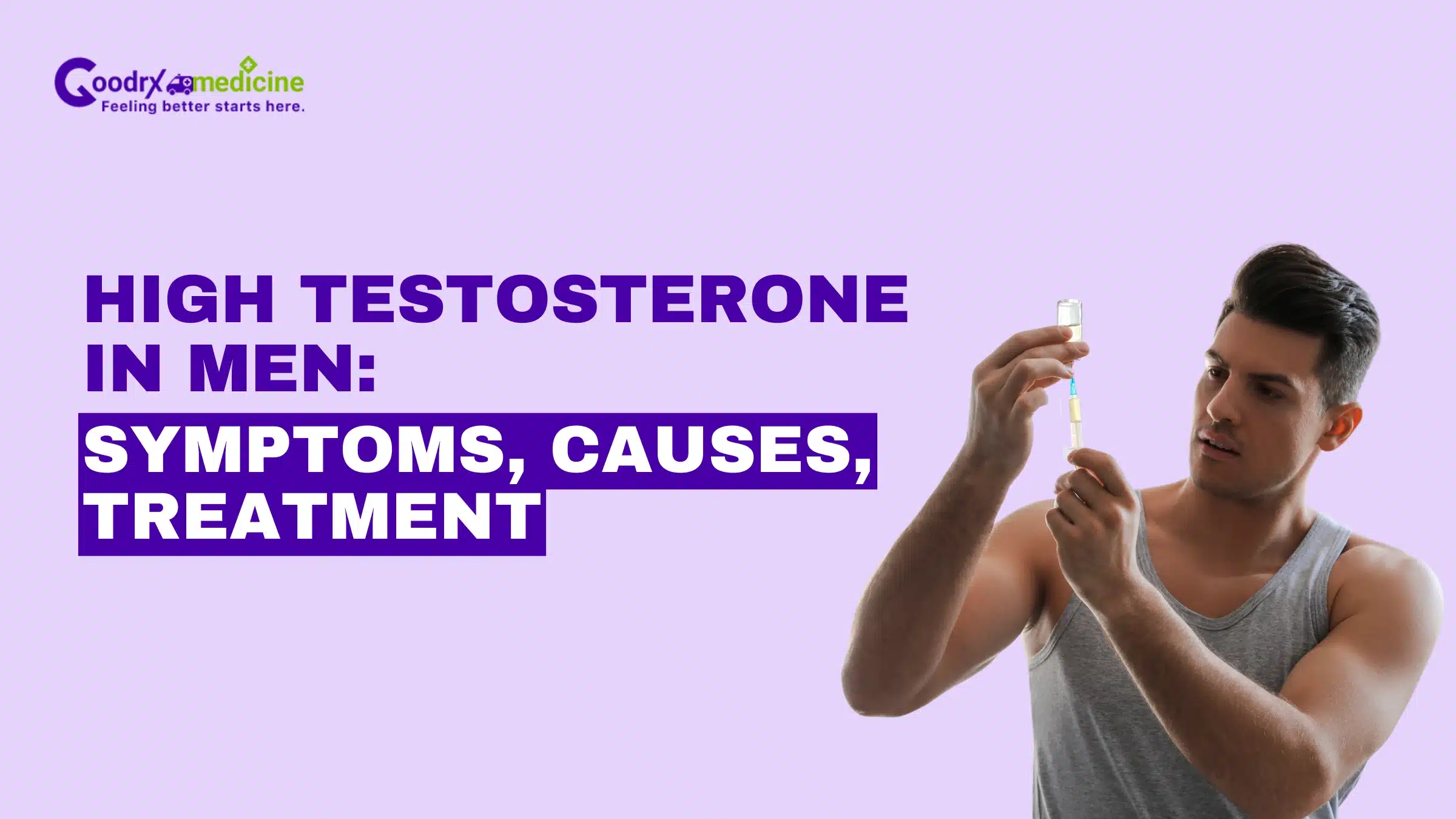Testosterone is the essential male sex hormone crucial in developing male reproductive tissues. It also develops secondary sexual characteristics, muscle mass, and bone density.
While much attention is given to Low Testosterone and its health impacts, High Testosterone in men is less commonly discussed. High Testosterone levels in men can have significant physiological and psychological effects. These are mainly caused by Testosterone Replacement Therapy, Adrenal or testicle tumors, and Anabolic steroid use.
This article explores the causes, symptoms, health risks, and management of excessive male hormones in detail.
High Testosterone levels in men
Testosterone is an Androgen or sex hormone naturally found in both men and women. Normal Testosterone levels can improve mood and muscle mass and boost your libido. However, persistently high levels of Testosterone can affect your overall health.
Testosterone levels vary with age and are measured in nanograms per deciliter (ng/dL). Testosterone peaks in your late teenage years and early 20s, with healthy levels ranging from 300 to 1,200 ng/dL.
If your Testosterone level falls to 200 ng/dL or lower, you will begin to experience Low Testosterone symptoms. These include decreased muscular mass, poor sperm count, and low libido or sex drive. It may also impair your capacity to obtain erections, which is known as Erectile Dysfunction.
On the other hand, Testosterone levels in males are considered high if they exceed 1,200 ng/dL. A rise in Testosterone over “normal” has its causes and symptoms, which we will discuss further.
High Testosterone in men symptoms
Usually, Testosterone levels in men fluctuate throughout the day, typically high in the morning and gradually declining throughout the day. However, consistently high or low levels of Testosterone can be a cause of concern.
If it remains persistently high, it can be challenging to identify High Testosterone levels in men. This is because, at certain times, symptoms appear related to the condition, which could indicate another health issue, such as an Adrenal or Testicular tumor.
However, you should be aware of High Testosterone symptoms, such as:
- Enlargement of the prostate gland
- Mood changes
- Aggressive attitude
- Unexplained weight gain
- Excessive hair growth or body hair
- Acne
- Issues with sleep, such as sleep apnea
- High Blood Pressure
- Headaches
High Testosterone side effects in men
High Testosterone levels in men often lead to more severe health complications such as:
Infertility
High Testosterone levels can decrease the sperm count, thus making you infertile. The elevated Testosterone levels in the blood reduce sperm production by lowering levels of Follicle-stimulating Hormone (FSH), a hormone required for sperm development.
Heart problems
Men who are taking Testosterone may experience serious cardiac issues, including Heart Failure. There is a direct relationship between High Testosterone levels and Heart Attack. Therefore, it is crucial to maintain your hormonal balance by consulting your doctor and seeking prescribed treatment.
Causes of High Testosterone in men
High Testosterone levels don’t occur naturally. Men may have high levels of Testosterone because of any of the following causes:
Testosterone Replacement Therapy (TRT)
Testosterone Replacement Therapy is one of the temporary causes of higher Testosterone levels in men. If you use topical TRT, it may unnecessarily increase your Testosterone levels. Furthermore, if you don’t thoroughly wash your hands after using it and touch other body parts, you may transfer Testosterone to your body more than the recommended dosage.
Usage of Anabolic steroids
The use of Anabolic steroids can often result in unusually increased Testosterone levels. Men use Androgenic/Anabolic steroids to improve their athletic performance and build muscles.
The amount of Testosterone in these steroids is around 10 to 30 times more than that of a dose of TRT. A study published by Plos One in 2016 states that former Anabolic steroid abusers experience lower Testosterone levels after quitting the intake of these steroids.
Tumors of the testicles or adrenals
Testosterone levels may also rise due to testicular or adrenal tumors. However, this is a rare scenario.
Two in a million people are at risk of having an adrenal gland tumor that produces sex hormones. Although these tumors aren’t necessarily cancerous, in some cases, they may produce excess Testosterone.
Diagnosing and treating High Testosterone in males
Doctors usually carry out physical examinations to rule out the underlying cause of elevated Testosterone levels in males. However, they may also suggest blood tests to measure a man’s Testosterone levels.
A blood test is usually done in the morning when the Testosterone levels are highest. If you are detected with abnormally high levels of Testosterone, your doctor will prescribe you the most effective treatment option based on the underlying cause and your symptoms.
Some possible ways to get your Testosterone back to normal include adjusting TRT, treating underlying health issues, and quitting Anabolic steroids:
- TRT adjustment: If you take TRT for Low Testosterone levels and your hormone levels become too high, your healthcare practitioner will adjust your dose. This will help return your blood Testosterone levels to a normal range.
- Treating underlying health issues: If a testicular tumor is causing your Testosterone levels to increase or is otherwise affecting your hormone levels, treating it may restore your Testosterone levels to normal. Your doctor might recommend surgery to get the tumor removed. If the tumor is cancerous, your doctor can advise you on the best action.
- Quitting Anabolic steroids: If you use Anabolic steroids for muscle build-up, you might show signs of High Testosterone, which may lead to a rise in your Testosterone levels. Since Anabolic steroids have risks and potential side effects, it is better to let your healthcare professional know before considering them.

Conclusion
While Testosterone levels fluctuate throughout the day, they are a cause of concern if they remain persistently high. High Testosterone in men can lead to some physical and psychological symptoms. These include acne, excessive hair growth, mood swings, sleep problems, and aggression from High Testosterone levels. In severe cases, it may also lead to infertility and heart problems.
In most cases, Anabolic steroid use, testicle or adrenal tumors, and Testosterone Replacement Therapy (TRT) can cause elevated Testosterone levels in men.
Hence, diagnosing and treating High Testosterone levels on time is crucial. Consult your doctor if you observe signs of High Testosterone. They can work with you to determine the cause of elevated Testosterone levels and prescribe an effective treatment plan to get them back to normal.
Frequently Asked Questions
Does masturbation lower Testosterone levels?
No, masturbation and ejaculation have been found to have no long-term negative impact on Testosterone levels. However, if you experience any significant change in your body, consult your doctor and seek immediate treatment.
Can High Testosterone increase the risk of blood clots?
Yes, men with High Testosterone, especially those with a genetic predisposition or who use Anabolic steroids, are at higher risk for developing blood clots. It can increase the risks of severe cardiovascular events.
Is there a link between High Testosterone and baldness?
Yes, High Testosterone can increase levels of Dihydrotestosterone (DHT), which is linked to Male Pattern Baldness in genetically susceptible men. It can lead to excessive hairfall that needs immediate medical attention and treatment.
Is there a link between High Testosterone and stunted growth in adolescents?
Yes, excess Testosterone in adolescents, especially from steroids, can lead to premature closure of growth plates in bones, resulting in stunted growth. It is recommended to avoid taking steroids without consulting your doctor.
When referencing outside resources, GoodrxMedicine always provides full citations. To learn more about the measures we use to maintain the quality of our content, please review our Content Information Policy.















